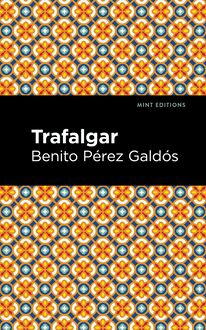-
 Univers
Univers
-
 Ebooks
Ebooks
-
 Livres audio
Livres audio
-
 Presse
Presse
-
 Podcasts
Podcasts
-
 BD
BD
-
 Documents
Documents
-
- Cours
- Révisions
- Ressources pédagogiques
- Sciences de l’éducation
- Manuels scolaires
- Langues
- Travaux de classe
- Annales de BEP
- Etudes supérieures
- Maternelle et primaire
- Fiches de lecture
- Orientation scolaire
- Méthodologie
- Corrigés de devoir
- Annales d’examens et concours
- Annales du bac
- Annales du brevet
- Rapports de stage
La lecture à portée de main
Vous pourrez modifier la taille du texte de cet ouvrage
Découvre YouScribe en t'inscrivant gratuitement
Je m'inscrisDécouvre YouScribe en t'inscrivant gratuitement
Je m'inscrisEn savoir plus
Vous pourrez modifier la taille du texte de cet ouvrage
En savoir plus

Description
Marianela (1878) is a novel by Benito Pérez Galdós. Published toward the beginning of Pérez Galdós’ career, Marianela is a powerful story of romance and disability that raises timeless questions regarding the meaning of love and the values associated with beauty. Adapted several times for film and television in Spain and abroad, the novel is Pérez Galdós’ most universal works of fiction. Everyone is familiar with the phrase “love at first sight,” but what about “love at first song?” In Marianela, Benito Pérez Galdós explores the ways we understand love in relation to worldly beauty. His contemporary fable is set in the fictional town of Socartes, where a young orphan named Marianela captures the heart of the blind youth Pablo through her beautiful singing. Their love is pure, and they plan to marry, but Pablo’s father has other plans. Hiring the famous doctor Teodoro Golfín to restore his son’s eyesight, he unwittingly threatens the unique relationship between Pablo and Marianela, whose physical features are far from society’s ideal. Although he promises to love her forever, Pablo feels pressured to marry his cousin Florentina. With a beautifully designed cover and professionally typeset manuscript, this edition of Benito Pérez Galdós’s Marianela is a classic of Spanish literature reimagined for modern readers.
Sujets
Informations
| Publié par | Mint Editions |
| Date de parution | 28 septembre 2021 |
| Nombre de lectures | 0 |
| EAN13 | 9781513293783 |
| Langue | English |
| Poids de l'ouvrage | 3 Mo |
Informations légales : prix de location à la page 0,0450€. Cette information est donnée uniquement à titre indicatif conformément à la législation en vigueur.
Extrait
Marianela
Benito Pérez Galdós
Marianela was first published in 1883.
This edition published by Mint Editions 2021.
ISBN 9781513290935 | E-ISBN 9781513293783
Published by Mint Editions ®
minteditionbooks .com
Publishing Director: Jennifer Newens
Design & Production: Rachel Lopez Metzger
Project Manager: Micaela Clark
Translated by: Clara Bell
Typesetting: Westchester Publishing Services
C ONTENTS T RANSLATOR ’ S P REFACE I. G ONE A STRAY II. G UIDED R IGHT III. A D IALOGUE WHICH EXPLAINS MUCH IV. S TONY H EARTS V. L ABOR AND A L ANDSCAPE WITH F IGURES VI. A BSURDITIES VII. M ORE A BSURDITIES VIII. A ND YET MORE IX. T HE B ROTHERS G OLFIN X. N OBODY ’ S C HILDREN XI. T HE P ATRIARCH OF A LDEACORBA XII. D OCTOR C ELIPIN XIII. B ETWEEN TWO B ASKETS XIV. H OW THE V IRGIN M ARY APPEARED TO N ELA XV. T HE T HREE C HILDREN XVI. T HE V OW XVII. A F UGITIVE XVIII. N ELA DECIDES THAT SHE MUST GO XIX. N ELA IS T AMED XX. A N EW W ORLD XXI. E YES THAT K ILL XXII. F AREWELL
T RANSLATOR ’ S P REFACE
T hose who have read Gloria will, it is hoped, hail with pleasure another work by the same writer, Perez Gald ó s—different it is true, but in its way not less delightful.
The strongly-marked humor and darkly-painted tragedy of Gloria are not to be found in “Marianela”; the characters are distinct and crisply sketched, but with a tender hand, the catastrophe is pitiable, rather shocking; the whole tone is idyllic.
I have not hesitated to translate literally the Spanish words of endearment; for though they are foreign to the calmer spirit of our northern tongue they are too characteristic to be lost, and they are strangely pathetic as the only outlet found for the imprisoned spirit of the hapless little heroine.
C LARA B ELL
I
G ONE A STRAY
T he sun had set. After the brief interval of twilight the night fell calm and dark, and in its gloomy bosom the last sounds of a sleepy world died gently away. The traveller went forward on his way, hastening his step as night came on; the path he followed was narrow and worn by the constant tread of men and beasts, and led gently up a hill on whose verdant slopes grew picturesque clumps of wild cherry trees, beeches and oaks.—The reader perceives that we are in the north of Spain.
Our traveller was a man of middle age, strongly built, tall and broad-shouldered; his movements were brisk and resolute, his step firm, his manner somewhat rugged, his eye bold and bright; his pace was nimble, considering that he was decidedly stout, and he was—the reader may at once be told, though somewhat prematurely—as good a soul as you may meet with anywhere. He was dressed, as a man in easy circumstances should be dressed for a journey in spring weather, with one of those round shady hats, which, from their ugly shape, have been nicknamed mushrooms ( hongo ), a pair of field-glasses hanging to a strap, and a knotted stick which, when he did not use it to support his steps, served to push aside the brambles when they flung their thorny branches across so as to catch his dress.
He presently stopped, and gazing round the dim horizon, he seemed vexed and puzzled. He evidently was not sure of his way and was looking round for some passing native of the district who might give him such topographical information as might enable him to reach his destination.
“I cannot be mistaken,” he said to himself. “They told me to cross the river by the stepping-stones—and I did so—then to walk on, straight on. And there, to my right, I do in fact, see that detestable town which I should call Villafangosa by reason of the enormous amount of mud that chokes the streets.—Well then, I can but go ‘on, straight on’—I rather like the phrase, and if I bore arms, I would adopt it for my motto—in order to find myself at last at the famous mines of Socartes.”
But before he had gone much farther, he added: “I have lost my way, beyond a doubt I have lost my way.—This, Teodoro Golfin, is the result of your ‘on, straight on.’ Bah! these blockheads do not know the meaning of words; either they meant to laugh at you or else they did not know the way to the mines of Socartes. A huge mining establishment must be evident to the senses, with its buildings and chimneys, its noise of hammers and snorting of furnaces, neighing of horses and clattering of machinery—and I neither see, nor hear, nor smell anything. I might be in a desert! How absolutely solitary! If I believed in witches, I could fancy that Fate intended me this night to have the honor of making acquaintance with some. Deuce take it! why is there no one to be seen in these parts? And it will be half an hour yet before the moon rises. Ah! treacherous Luna, it is you who are to blame for my misadventure.—If only I could see what sort of place I am in.—However, what could I expect?” and he shrugged his shoulders with the air of a vigorous man who scorns danger. “What, Golfin, after having wandered all round the world are you going to give in now? The peasants were right after all: ‘on, straight on.’ The universal law of locomotion cannot fail me here.”
And he bravely set out to test the law, and went on about a kilometre farther, following the paths which seemed to start from under his feet, crossing each other and breaking off at a short distance, in a thousand angles which puzzled and tired him. Stout as his resolution was, at last he grew weary of his vain efforts. The paths, which had at first all led upwards, began to slope downwards as they crossed each other, and at last he came to so steep a slope that he could only hope to get to the bottom by rolling down it.
“A pretty state of things!” he exclaimed, trying to console himself for this provoking situation by his sense of the ridiculous. “Where have you got to now my friend? This is a perfect abyss. Is anything to be seen at the bottom. No, nothing, absolutely nothing—the hill-side has disappeared, the earth has been dug away. There is nothing to be seen but stones and barren soil tinged red with iron. I have reached the mines, no doubt of that—and yet there is not a living soul to be seen, no smoky chimneys; no noise, not a train in the distance, not even a dog barking. What am I to do? Out there the path seems to slope up again.—Shall I follow that? Shall I leave the beaten track? Shall I go back again? Oh! this is absurd! Either I am not myself or I will reach Socartes tonight, and be welcomed by my worthy brother! ‘On, straight on.’”
He took a step, and his foot sank in the soft and crumbling soil. “What next, ye ruling stars? Am I to be swallowed up alive? If only that lazy moon would favor us with a little light we might see each other’s faces—and, upon my soul, I can hardly expect to find Paradise at the bottom of this hole. It seems to be the crater of some extinct volcano… Nothing could be easier than a slide down this beautiful precipice. What have we here? … A stone; capital—a good seat while I smoke a cigar and wait for the moon to rise.”
The philosophical Golfin seated himself as calmly as if it were a bench by a promenade, and was preparing for his smoke, when he heard a voice—yes, beyond a doubt, a human voice, at some little distance—a plaintive air, or to speak more accurately, a melancholy chant of a single phrase, of which the last cadence was prolonged into a “dying fall,” and which at last sank into the silence of the night, so softly that the ear could not detect when it ceased.
“Come,” said the listener, well pleased, “there are some human beings about. That was a girl’s voice; yes, certainly a girl’s, and a lovely voice too. I like the popular airs of this country-side. Now it has stopped… Hark! it will soon begin again… Yes, I hear it once more. What a beautiful voice, and what a pathetic air! You might believe that it rose from the bowels of the earth, and that Se ñ or Golfin, the most matter-of-fact and least superstitious man in this world, was going to make acquaintance with sylphs, nymphs, gnomes, dryads, and all the rabble rout that obey the mysterious spirit of the place.—But, if I am not mistaken, the voice is going farther away—the fair singer is departing… Hi, girl, child, stop—wait a minute! …”
The voice which had for a few minutes so charmed the lost wanderer with its enchanting strains was dying away in the dark void, and at the shouts of Golfin it was suddenly silent. Beyond a doubt the mysterious gnome, who was solacing its underground loneliness by singing its plaintive loves, had taken fright at this rough interruption by a human being, and fled to the deepest caverns of the earth, where precious gems lay hidden, jealous of their own splendor.
“This is a pleasant state of things—” muttered Golfin, thinking that after all he could do no better than light his cigar.—“There seems no reason why it should not go on for a hundred years. I can smoke and wait. It was a clever idea of mine that I could walk up alone to the mines of Socartes. My luggage will have got there before me—a signal proof of the advantages of ‘on, straight on.’”
A light breeze at this instant sprang up, and Golfin fancied he heard the sound of footsteps at the bottom of the unknown—or imaginary— abyss before him; he listened sharply, and in a minute felt quite certain that someone was walking below. He stood up and shouted:
“Girl, man, or whoever you are, can I get to the mines of Socartes by this road?”
He had not done speaking when he heard a dog barking wildly, and then a manly voice saying: “Choto, Choto! come here!”
“Hi there!” cried the traveller. “My good friend—man, boy, demon, or whatever you are, call back your dog, for I am a man of peace.”
“Choto, Choto! …”
Golfin could make out the form of a large, black dog coming towards him, but after sniffing round him it retired at its master’s call; and at that moment the traveller could distinguish a figure, a man, standin
-
 Univers
Univers
-
 Ebooks
Ebooks
-
 Livres audio
Livres audio
-
 Presse
Presse
-
 Podcasts
Podcasts
-
 BD
BD
-
 Documents
Documents
-
Jeunesse
-
Littérature
-
Ressources professionnelles
-
Santé et bien-être
-
Savoirs
-
Education
-
Loisirs et hobbies
-
Art, musique et cinéma
-
Actualité et débat de société
-
Jeunesse
-
Littérature
-
Ressources professionnelles
-
Santé et bien-être
-
Savoirs
-
Education
-
Loisirs et hobbies
-
Art, musique et cinéma
-
Actualité et débat de société
-
Actualités
-
Lifestyle
-
Presse jeunesse
-
Presse professionnelle
-
Pratique
-
Presse sportive
-
Presse internationale
-
Culture & Médias
-
Action et Aventures
-
Science-fiction et Fantasy
-
Société
-
Jeunesse
-
Littérature
-
Ressources professionnelles
-
Santé et bien-être
-
Savoirs
-
Education
-
Loisirs et hobbies
-
Art, musique et cinéma
-
Actualité et débat de société
- Cours
- Révisions
- Ressources pédagogiques
- Sciences de l’éducation
- Manuels scolaires
- Langues
- Travaux de classe
- Annales de BEP
- Etudes supérieures
- Maternelle et primaire
- Fiches de lecture
- Orientation scolaire
- Méthodologie
- Corrigés de devoir
- Annales d’examens et concours
- Annales du bac
- Annales du brevet
- Rapports de stage
















